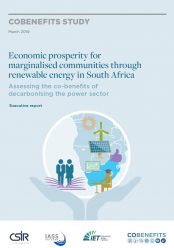 South Africa’s renewable energy (RE) procurement policy is globally unique in its emphasis on providing benefits for communities in the vicinity of projects participating in the RE Independent Power Producer Procurement Programme (REIPPPP). RE projects are primarily located in rural communities, frequently categorised as “marginalised communities”. The REIPPPP has created a legal framework to incentivise IPPs to channel benefits to communities near RE project sites through a range of means, including local employment quotas, community ownership in RE projects, as well as contributing a proportion of their revenue towards development spending, known as socio-economic development (SED) and enterprise development (ED) spend. This study assesses the SED and ED impacts of renewable energy deployment in marginalised communities in South Africa. It entails the assessment of selected socio-economic impacts, realised to date, in three REIPPPP project areas, along with projections and modelling the assessed impacts (up to 2030 for the medium term, and 2050 for the long term) across a range of power sector decarbonisation scenarios.
South Africa’s renewable energy (RE) procurement policy is globally unique in its emphasis on providing benefits for communities in the vicinity of projects participating in the RE Independent Power Producer Procurement Programme (REIPPPP). RE projects are primarily located in rural communities, frequently categorised as “marginalised communities”. The REIPPPP has created a legal framework to incentivise IPPs to channel benefits to communities near RE project sites through a range of means, including local employment quotas, community ownership in RE projects, as well as contributing a proportion of their revenue towards development spending, known as socio-economic development (SED) and enterprise development (ED) spend. This study assesses the SED and ED impacts of renewable energy deployment in marginalised communities in South Africa. It entails the assessment of selected socio-economic impacts, realised to date, in three REIPPPP project areas, along with projections and modelling the assessed impacts (up to 2030 for the medium term, and 2050 for the long term) across a range of power sector decarbonisation scenarios.
Download:
Key policy opportunities:
Policy opportunity 1: By the year 2050, IRP 2018 will have created almost 5,000 jobs through socio-economic and enterprise development (SED and ED) and enabled 19,000 individuals to benefit from access to education-related programmes. These socio-economic benefits for marginalised communities could even be increased by an additional 100 % and 50 % respectively, by scaling up the adoption of renewable energy (RE) in line with the more ambitious low-carbon energy pathways.
Policy opportunity 2: Without stronger guidance, large-scale REIPPPP3 projects may not deliver the anticipated level of significant benefits for marginalised communities: The IPP Office should be better positioned to lead engagement with the local and district municipalities that host independent power producers (IPP), to ensure a detailed understanding of the REIPPPP mechanisms and the intended role of power producers within the communities.
Policy opportunity 3: Prior engagement of IPPs with the various community stakeholders, in pre- and post-project commissioning, forms the basis for renewable energy projects to deliver on their socio-economic promises. Codifying these requirements by means of a REIPPPP Practice Guide would strengthen the delivery of more direct and measurable socio-economic and enterprise-related benefits to the host and marginalised communities.
Year of publication: 2019
Editors: Ayodeji Okunlola, David Jacobs, Ntombifuthi Ntuli, Ruan Fourie, Laura Nagel and Sebastian Helgenberger – IASS Potsdam, CSIR and IET
Technical implementation: Fumani Mthembi, Anthony Dane, Holle Wlokas, Louise Tait, Lauren Hermanus, Nolwazi Sokhulu, Mbali Mabaso, Tlhologelo Relela – Knowledge Pele, University of Stellenbosch – Centre for Complex Systems in Transition, and Change Pathways
Suggested citation: IASS/CSIR. Economic prosperity for marginalised communities through renewable energy in South Africa. Assessing the co-benefits of decarbonising the power sector. Potsdam/Pretoria: IASS/CSIR, 2019.
DOI: 10.2312/iass.2019.010
This study is part of a 2019 series of four studies assessing the co-benefits of decarbonising the power sector in South Africa, edited by IASS and CSIR:
